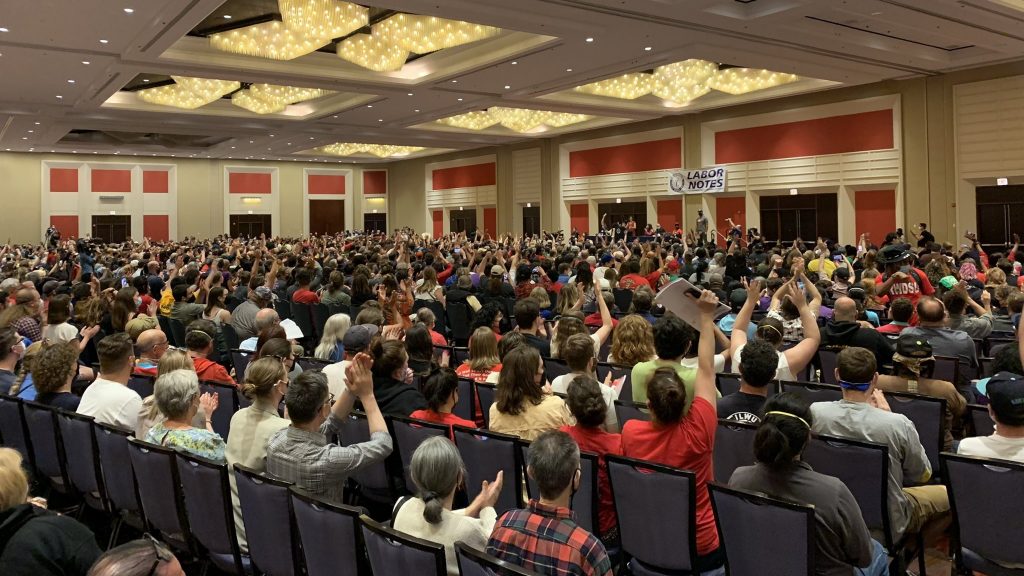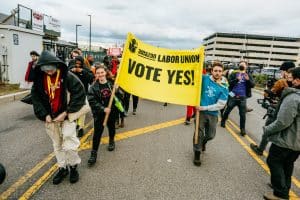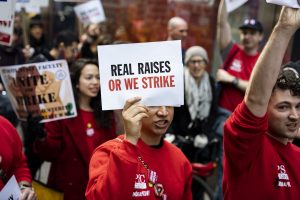A Growing Layer of Union Activists …
The first thing on everyone’s mind at the conference was the sheer size of the thing. Four thousand people registered. It was a sold-out crowd, and the biggest ever at a Labor Notes conference. Almost every session I went to was overflowing: the chairs were all filled; the walls were lined with bodies; people crouched in all the aisles.
It’s a key point because Labor Notes is one of the ways the most committed, energized rank-and-file activists in the labor movement — representing a swathe of industries and unions across the country and the world — gather themselves and talk to each other.
The fact that this was the biggest Labor Notes conference means that that active, energized layer of activists — helping drive union struggle across the country — is growing.
Not only is it growing, it’s discussing how to fight in a militant, disruptive way.
Striking was a key topic. The Teamsters are preparing to negotiate a contract next year at UPS, and it seems like a UPS strike is on the horizon. Two members of the caucus Teamsters for a Democratic Union gave a seminar on Saturday afternoon on how to prepare a strike, based on their own experience in 1997. The panel also explored how to strike during a contract too — something labor bureaucrats have been terrified of for decades.
Another panel explored how to strike without a contract. There, a panelist said labor law is not the source of power — and he’s right. Our power comes from how well we can organize and squeeze the profits we make for the bosses, he said — not waiting for the government to save us. In the same vein, Joe Burns — author of the new Class Struggle Unionism and part of the leadership of the AFA-CWA union — called for a “class struggle unionism” unafraid to break laws when it strikes.
These are all ideas reaching a growing layer of union activists now. And many of the labor activists hearing these ideas were young, and often queer — part of “generation U,” as I’ll say again later, who don’t have the huge weight of an old bureaucracy teaching them to be “careful,” to avoid strikes, to play it safe.
… and a Radical Layer
But it’s not just that the conference was huge or that it was throwing around militant ideas. It’s also that, again and again, it seemed like the huge audiences were far more radical, far more to the left, than many of the panelists themselves. Again and again, they drove the conversation in more radical directions.
For example, not a single official panel title or description on the Labor Notes conference program mentions socialism. But at every panel I saw, the audience brought up socialism and said (in one way or another) that socialism is the goal of our fight.
Another example. One panel said it would tackle how unions should relate to the problem of the murderous, racist police. On that panel sat a member of a nonprofit in Minneapolis. He stood up to talk about how to reduce the tensions between communities and the police. He said, “Well, we know, not all cops are bad, some are really good people.” The audience jeered him: “Fuck 12! Fuck the police!”
During the Q&A, one of my own Left Voice comrades — a rank-and-file activist from SEIU in Los Angeles — stood up. She pointed out that cops aren’t just the descendants of slave catchers. They’re strikebreakers, enemies of every real union. Cops have no place in the labor movement, and we need to kick them out of all our unions and federations to strengthen the movement, she said — to wide applause.
It was just after this that a Minneapolis activist — identifying themselves as queer and Black — stood up. They pointed out the ways that nonprofits worked overtime in the wake of the huge 2020 uprising to co-opt the struggle for racial justice, to rob the movement of its radical energy, and to channel it in safer directions — then led us in Assata Shakur’s chant: “It is our duty to fight for our freedom. It is our duty to win. We must love and support one another. We have nothing to lose but our chains.” The crowd cheered them on.
All this seems like an important change from other kinds of LN meetings. In 2021 — just one year after the biggest social movement in history, which was a struggle against racist police — I went to Labor Notes’ “Troublemaker School” in Philly. It was nothing like this.
It was big. But by comparison, it was much tamer. The only session on racial justice and unions was like an HR session from my boss. It called for us (individually) to be anti-racist in our unions — surely a good message. But never did the speakers talk about our own unions’ role in fighting the murderous, racist cops. I raised the issue, but it fizzled.
In fact, the content of our discussions at this year’s conference was a major move to the left from Labor Notes as an organization. The pages of LN never, or almost never, hazard a mention of socialism. They don’t dare criticize the Democrats like even some of this year’s panelists did (I’ll mention them in a minute).
At least part of the reason might be “Generation U” — the new layer of young, often queer, activists driving the new unions. The Starbucks and Amazon unions were a major presence — not only were many of their activists there, but they were the equivalent of labor “celebrities” — cheered at every chance. And we know that younger people are far more likely to be deeply critical of capitalism and open to socialism.
Powerful Contradictions …
But this conference was a showcase for powerful contradictions in this layer of the labor movement — especially around politics.
People were grappling with the problem of the Democratic Party. At multiple sessions, activists raised major, and crucial, critiques of the Democrats — a party that has betrayed, constantly, the labor movement. The highest pitch of that critique came from Joe Burns, at a panel on his new book.
There, for example, Burns pointed out just how toothless and cynical the Democrat promises of the PRO Act are. Those promises face the combined power of U.S. judges who side with the ruling class, not workers. Even if that law could be passed — it almost certainly can’t be — judges are standing by ready to interpret it in the narrowest, most useless way possible. And the Democratic Party came up again in a workshop about organizing and bargaining around abortion rights. Several attendees brought up being let down for decades by the Democratic Party, and the need for a mass movement, led by the labor movement, to win abortion rights in the United States.
But there’s a deep reluctance at the top of our unions to take this logic to its natural end — calling for cutting our unions’ ties to the Democrats and building an independent party for the working class. At a panel that Sara Nelson facilitated, the room was again overflowing. People stood and crouched for lack of chairs in a massive space that could hold hundreds. At one point Nelson blasted the Democrats. She pointed out just how badly Democrats and Republicans both had betrayed labor.
So a comrade of mine in Left Voice put out the obvious point: If the Democrats are so awful to labor, let’s cut ties, let’s create our own, independent party! It was an idea that was met with mad clapping and shouts of agreement.
Nelson grabbed the mic — and waffled. “Workers don’t need their own party. If they have more power over production, the parties will come to them!”
But this is astonishing. It flies in the face of history. Even when unions were much bigger — in the 1950s and 1960s — Democrats worked overtime to co-opt, limit, restrict, and betray the movement. For just one example: Democrats and Republicans stood arm in arm in 1947 to pass the Taft-Hartley Act, which radically undercut and hemmed in the ways unions could legally strike.
We see the same contradiction in the fact that, at this meeting for labor rank-and-filers, the LN staff spent so much time and energy preparing for speeches by a Democrat — Bernie Sanders.
Bernie is definitely a reason many young people to socialist ideas. He surely has their ear. But that situation is full of contradictions, too. Despite all this, he serves a party that has refused to lift a finger for labor, that helped usher in the neoliberal revolution against labor, that champions the bombing and murder of working-class people around the globe. In 2020 his run for president helped gather these radical forces on the U.S. Left — but only to endorse Biden, who opposes key working-class struggles: for police abolition, to put up a real fight for abortion rights in the streets — and on and on. Whether he wants to or not, Bernie is helping keep this dynamic going, helping pull radicals into the the Democratic Party, the graveyard of social movements.
And we see a contradiction in how Labor Notes relates to union bureaucracy too. Labor leaders have played a major role in tamping down real rank-and-file struggle — exactly the kind of struggle Labor Notes exists to stir up. And far from shrinking in recent years, that bureaucracy has been exploding in size and power over rank-and-filers.
Surely that bureaucratic system has major contradictions of its own. Nelson isn’t the same kind of leader as the late Richard Trumka. In fact, it was Burns — in the leadership at AFA-CWA with Sara Nelson — who criticized most labor leaders during his panel (and in his book Class Struggle Unionism). But even though the idea of union democracy was much discussed — as it should be! — the critique of bureaucracy, what it is, how it exerts its power, how it tries to control the rank and file — was curiously muted in most of the sessions I went to, as it is on the pages of Labor Notes too.
But all this shows that something important is happening — symptoms of something much larger.
… and Powerful Possibilities
What’s most important in all this isn’t just the lack of imagination in even a stirring, brilliant speaker like Nelson, or the limits of Sanders.
What’s important is that people like Nelson and Burns, and Bernie too, are bellwethers — or canaries in coal mines, or tuning forks — registering something bigger than them, that doesn’t quite have its voice yet — something new, and possibly powerful, at work in a dark way inside labor itself.
It’s true that unions’ bureaucratic leaders have spent many decades in a love affair with Democrats. But this is true even of a more leftward union leader like Nelson, who endorsed Biden in 2020. Still, the fact that Nelson did not champion the Democrats at the conference is a kind of ripple, on the surface, of a force from below requiring her to shift. Labor Notes became — in many cases despite the official programming — a place to critique the Democrats and, at least here and there, tentatively, to think about alternatives.
And the same goes for Labor Notes as a whole. The big, roiling mass audience was constantly surging past the more restricted, narrower limits of Labor Notes as an organization. Here we see a hidden power struggling inside the most energized layers of unions.
Something is stirring inside labor. The goal now is for us to fight to help give it shape and expand its power: for a radical, militant force in the labor movement, breaking free from all capitalist political parties, struggling for radical, bottom-up control of unions — to build a labor movement that could really fight for the overthrow of this rotten system and the building of socialism.










